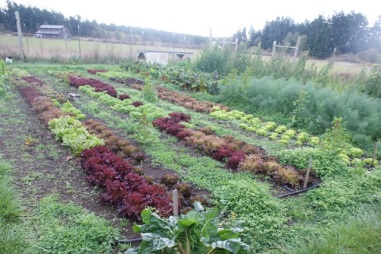
Bulk Buying on the Homestead: Saving Money & Reducing Waste
Imagine a pantry overflowing with nutritious, locally sourced grains, legumes, and nuts, ready to nourish your family through any season. The aroma of freshly baked bread, hearty stews simmering on the stove, and the knowledge that you have ample supplies to weather any storm – this is the promise of buying bulk dry goods for the homestead.
Bulk buying is simply purchasing food in large quantities, rather than pre-packaged single servings. For homesteaders, this practice offers a unique trifecta of benefits: significant cost savings, a dramatic reduction in packaging waste, and a boost to your overall self-sufficiency. This blog post is your practical guide to sourcing and storing bulk dry goods, equipping you with the knowledge to transform your homestead pantry into a bastion of abundance and resilience.

A well-stocked pantry filled with bulk dry goods not only provides sustenance but also adds a visual appeal to your homestead kitchen.
Why Buy Bulk? The Homestead Advantage
The advantages of buying dry goods in bulk for your homestead are multifaceted, impacting your wallet, the environment, and your overall homesteading philosophy.
Cost Savings: Let’s face it, homesteading can be an expensive endeavor. Buying in bulk is one of the most effective ways to cut costs. Consider oats, for example. A pre-packaged container of rolled oats might cost $3 for 16 ounces. Buying a 25-pound bag of rolled oats in bulk could bring the price down to $1.50 per pound or less. Over time, the savings add up significantly, especially for staples you use regularly. The key is to compare the price per unit – usually measured by the pound or ounce – to determine the true cost savings.
Reduced Packaging Waste: Our modern world is drowning in single-use packaging. Plastic containers, cardboard boxes, and plastic bags contribute significantly to landfills and pollute our environment. Bulk buying allows you to drastically reduce your packaging footprint. By bringing your own reusable containers to fill, you eliminate the need for most of that disposable packaging. This aligns perfectly with the eco-conscious values of homesteading.
Increased Shelf Life: Many dry goods boast an impressive shelf life when stored correctly in bulk. Grains, legumes, and even some nuts and seeds can last for years if kept in airtight containers in a cool, dark, and dry place. This is a significant advantage over pre-packaged items, which are often stored in less ideal conditions and may have already been sitting on store shelves for weeks or months.
Greater Control Over Quality: Sourcing bulk dry goods allows you more opportunities to vet your suppliers and ensure the quality of your food. You can ask about their growing practices, inspect the products before purchasing, and even build relationships with local farmers and producers. This is especially important if you prioritize organic or non-GMO foods.
Emergency Preparedness: A well-stocked pantry filled with bulk dry goods provides a vital safety net during unexpected events. Whether it's a power outage, a natural disaster, or simply a tight financial month, having a reserve of essential foods can provide peace of mind and ensure your family is well-nourished.

Visually comparing the packaging volume between pre-packaged oatmeal and bulk oats helps illustrate the waste reduction benefit of bulk buying.
Buying bulk is a triple win: good for your wallet, good for the planet, and good for your peace of mind. It's a cornerstone of a resourceful and resilient homestead.
What to Buy in Bulk for the Homestead
The specific dry goods you choose to buy in bulk will depend on your family's dietary needs, your regional climate, and your overall homesteading goals. However, some staples are almost universally beneficial.
- Grains: Wheat berries (for grinding your own flour), oats (rolled or steel-cut), rice (brown, white, or wild), quinoa, barley, cornmeal, spelt, rye, and buckwheat are all excellent candidates for bulk purchase. They form the foundation for many meals and can be used in everything from bread baking to hearty soups and stews.
- Legumes: Beans (pinto, black, kidney, navy, etc.), lentils (green, red, brown), dried peas, and chickpeas are packed with protein and fiber and are essential for a balanced diet. They're also relatively inexpensive and easy to store.
- Nuts & Seeds: Sunflower seeds, pumpkin seeds, flax seeds, walnuts, almonds, and peanuts provide healthy fats, vitamins, and minerals. Use them as snacks, add them to baked goods, or make your own nut butters.
- Flours: If you don't have a grain mill, you can still buy flours in bulk. Whole wheat flour, all-purpose flour, rice flour, and corn flour are all good options.
- Other Essentials: Don't forget about the smaller items that you use regularly. Salt, sugar (consider raw or unrefined options), dried herbs and spices, baking soda, and baking powder can all be purchased in bulk, saving you money and reducing packaging waste.
When deciding what to buy, carefully consider your family's eating habits and dietary restrictions. There’s no point in buying 50 pounds of buckwheat if no one in your family enjoys it. Also, consider your local climate and gardening plans. If you live in an area where you can grow beans easily, you might want to prioritize buying other staples in bulk.
A good approach is to start with a few key items that you know you'll use regularly and then gradually expand your bulk buying list as you become more comfortable with the process.
Finding Reputable Bulk Suppliers
Sourcing your bulk dry goods from reputable suppliers is crucial for ensuring quality, freshness, and ethical practices. Here are several options to consider:
Local Farmers & Producers: Supporting local agriculture is a cornerstone of sustainable homesteading. Sourcing directly from farmers or producers allows you to build relationships with the people who grow your food, learn about their farming practices, and ensure that you're getting the freshest possible products. Many farmers markets and CSA (Community Supported Agriculture) programs offer bulk buying options. Advantages include fresher produce, support for the local economy, and a more transparent supply chain.
Co-ops & Buying Clubs: Food co-ops are member-owned businesses that offer access to bulk goods at discounted prices. Buying clubs operate similarly, pooling resources to purchase larger quantities of products at wholesale rates. Joining a co-op or buying club can be an excellent way to save money and connect with other like-minded individuals in your community.
Bulk Food Stores: Several national and regional chains specialize in bulk food sales. These stores typically offer a wide variety of dry goods, as well as other products like spices, oils, and cleaning supplies. Look for stores that prioritize organic and non-GMO options.
Online Retailers: While convenient, sourcing bulk dry goods online requires careful research. Read reviews thoroughly, check the supplier's reputation, and be wary of prices that seem too good to be true. Look for online retailers that specialize in homesteading supplies or organic foods.
When choosing a supplier, consider factors like price, proximity, organic certification (if important to you), and ethical sourcing practices. Prioritize local and ethical suppliers whenever possible to support sustainable agriculture and your community.
Essential Storage Solutions for Bulk Dry Goods
Proper storage is essential for maintaining the quality and extending the shelf life of your bulk dry goods.
Airtight Containers: Invest in high-quality, airtight containers. Glass jars, food-grade buckets with airtight lids, and metal tins are all excellent options. Make sure the containers are clean and dry before filling them. The key is to prevent moisture and pests from entering the containers.
Cool, Dark, and Dry Storage: Store your bulk dry goods in a cool, dark, and dry place. Avoid storing them near heat sources or in areas with high humidity. Basements, pantries, and even closets can be suitable storage locations, as long as they meet these conditions.
Proper Labeling: Label each container clearly with the date of purchase, the type of product, and any relevant storage instructions. This will help you keep track of your inventory and ensure that you're using the oldest items first.
Pest Prevention: Pests like moths, weevils, and rodents can quickly decimate your bulk dry goods. Implement natural pest control methods, such as placing bay leaves in your containers or using diatomaceous earth around your storage area. Regularly inspect your containers for signs of infestation and clean up any spills promptly.
Rotating Stock: Implement a first-in, first-out (FIFO) method to ensure freshness and prevent spoilage. When you purchase new items, place them behind the older items in your containers. This will encourage you to use the older items first, minimizing the risk of them going bad.
Extending Bulk Buying to Other Homestead Supplies
Once you've mastered buying bulk dry goods, consider extending this approach to other areas of your homestead.
Animal Feed: If you raise livestock, you can buy oats, barley, corn, and other grains in bulk to supplement or replace commercial feed. This can save you money and allow you to customize your animals' diets to meet their specific needs.
Gardening Supplies: Some gardening supplies, such as fertilizer, soil amendments, and seed starting mixes, can be purchased in larger quantities. Check with your local garden center or agricultural supply store for bulk options.
Cleaning Supplies: Natural cleaning agents like baking soda, vinegar, and borax can be purchased in bulk to reduce plastic waste and save money. These ingredients can be used to make a wide variety of cleaning products for your home and homestead.
Embrace a gradual approach: start with a few key items and expand as you gain experience and confidence.
Conclusion
Buying bulk dry goods is a powerful strategy for building a resilient and sustainable homestead. By saving money, reducing waste, and increasing your self-sufficiency, you can create a more secure and fulfilling lifestyle. It requires a bit of planning and effort upfront, but the long-term benefits are well worth it. So, take the plunge, start small, and discover the abundance that bulk buying can bring to your homestead.
What are your favorite bulk buying tips? Share them in the comments below!